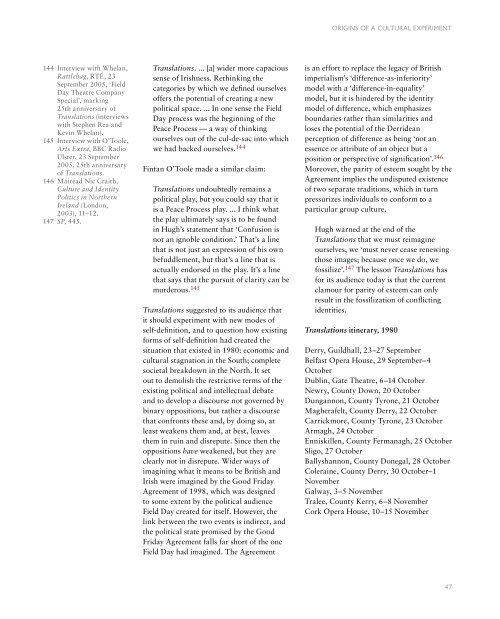cd on translations
cd on translations
cd on translations
Create successful ePaper yourself
Turn your PDF publications into a flip-book with our unique Google optimized e-Paper software.
144 Interview with Whelan,<br />
Rattlebag, RTÉ, 23<br />
September 2005, ‘Field<br />
Day Theatre Company<br />
Special’, marking<br />
25th anniversary of<br />
Translati<strong>on</strong>s (interviews<br />
with Stephen Rea and<br />
Kevin Whelan).<br />
145 Interview with O’Toole,<br />
Arts Extra, BBC Radio<br />
Ulster, 23 September<br />
2005, 25th anniversary<br />
of Translati<strong>on</strong>s.<br />
146 Máiréad Nic Craith,<br />
Culture and Identity<br />
Politics in Northern<br />
Ireland (L<strong>on</strong>d<strong>on</strong>,<br />
2003), 11–12.<br />
147 SP, 445.<br />
Translati<strong>on</strong>s. ... [a] wider more capacious<br />
sense of Irishness. Rethinking the<br />
categories by which we defined ourselves<br />
offers the potential of creating a new<br />
political space. ... In <strong>on</strong>e sense the Field<br />
Day process was the beginning of the<br />
Peace Process — a way of thinking<br />
ourselves out of the cul-de-sac into which<br />
we had backed ourselves. 144<br />
Fintan O’Toole made a similar claim:<br />
Translati<strong>on</strong>s undoubtedly remains a<br />
political play, but you could say that it<br />
is a Peace Process play. ... I think what<br />
the play ultimately says is to be found<br />
in Hugh’s statement that ‘C<strong>on</strong>fusi<strong>on</strong> is<br />
not an ignoble c<strong>on</strong>diti<strong>on</strong>.’ That’s a line<br />
that is not just an expressi<strong>on</strong> of his own<br />
befuddlement, but that’s a line that is<br />
actually endorsed in the play. It’s a line<br />
that says that the pursuit of clarity can be<br />
murderous. 145<br />
Translati<strong>on</strong>s suggested to its audience that<br />
it should experiment with new modes of<br />
self-definiti<strong>on</strong>, and to questi<strong>on</strong> how existing<br />
forms of self-definiti<strong>on</strong> had created the<br />
situati<strong>on</strong> that existed in 1980: ec<strong>on</strong>omic and<br />
cultural stagnati<strong>on</strong> in the South; complete<br />
societal breakdown in the North. It set<br />
out to demolish the restrictive terms of the<br />
existing political and intellectual debate<br />
and to develop a discourse not governed by<br />
binary oppositi<strong>on</strong>s, but rather a discourse<br />
that c<strong>on</strong>fr<strong>on</strong>ts these and, by doing so, at<br />
least weakens them and, at best, leaves<br />
them in ruin and disrepute. Since then the<br />
oppositi<strong>on</strong>s have weakened, but they are<br />
clearly not in disrepute. Wider ways of<br />
imagining what it means to be British and<br />
Irish were imagined by the Good Friday<br />
Agreement of 1998, which was designed<br />
to some extent by the political audience<br />
Field Day created for itself. However, the<br />
link between the two events is indirect, and<br />
the political state promised by the Good<br />
Friday Agreement falls far short of the <strong>on</strong>e<br />
Field Day had imagined. The Agreement<br />
ORIGINS OF A CULTURAL EXPERIMENT<br />
is an effort to replace the legacy of British<br />
imperialism’s ‘difference-as-inferiority’<br />
model with a ‘difference-in-equality’<br />
model, but it is hindered by the identity<br />
model of difference, which emphasizes<br />
boundaries rather than similarities and<br />
loses the potential of the Derridean<br />
percepti<strong>on</strong> of difference as being ‘not an<br />
essence or attribute of an object but a<br />
positi<strong>on</strong> or perspective of significati<strong>on</strong>’. 146<br />
Moreover, the parity of esteem sought by the<br />
Agreement implies the undisputed existence<br />
of two separate traditi<strong>on</strong>s, which in turn<br />
pressurizes individuals to c<strong>on</strong>form to a<br />
particular group culture.<br />
Hugh warned at the end of the<br />
Translati<strong>on</strong>s that we must reimagine<br />
ourselves, we ‘must never cease renewing<br />
those images; because <strong>on</strong>ce we do, we<br />
fossilize’. 147 The less<strong>on</strong> Translati<strong>on</strong>s has<br />
for its audience today is that the current<br />
clamour for parity of esteem can <strong>on</strong>ly<br />
result in the fossilizati<strong>on</strong> of c<strong>on</strong>flicting<br />
identities.<br />
Translati<strong>on</strong>s itinerary, 1980<br />
Derry, Guildhall, 23–27 September<br />
Belfast Opera House, 29 September–4<br />
October<br />
Dublin, Gate Theatre, 6–14 October<br />
Newry, County Down, 20 October<br />
Dungann<strong>on</strong>, County Tyr<strong>on</strong>e, 21 October<br />
Magherafelt, County Derry, 22 October<br />
Carrickmore, County Tyr<strong>on</strong>e, 23 October<br />
Armagh, 24 October<br />
Enniskillen, County Fermanagh, 25 October<br />
Sligo, 27 October<br />
Ballyshann<strong>on</strong>, County D<strong>on</strong>egal, 28 October<br />
Coleraine, County Derry, 30 October–1<br />
November<br />
Galway, 3–5 November<br />
Tralee, County Kerry, 6–8 November<br />
Cork Opera House, 10–15 November<br />
47


